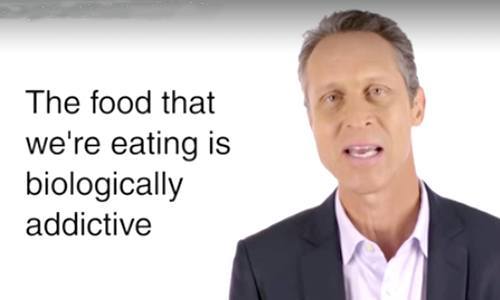


If you can identify with my reader, you’re not alone. Of the more than 600,000 food products—note I said food products, not food—80 percent have added sugar.
We went from eating about 10 pounds of sugar per person, per year in 1800 to 152 pounds of sugar (and 146 pounds of flour) per person, per year today. Think about it: On average we eat about one pound of sugar every day!
Those sugar-loaded foods literally become drugs: Doses of sugar and flour that hijack our metabolism and make us fat and sick.
Many patients tell me once they dive into a box of chips or cookies, they literally can’t stop eating. Have you ever wondered why you would devour a box of cookies but you wouldn’t binge on wild salmon?
The reason isn’t because you lack self-discipline or are weak-willed. You are not emotionally weak or lazy. You are biologically addicted to sugar and willpower doesn’t work here.
The good news is that I have something that does work. But let’s take a quick look at what created that addiction.
The Science of Sugar Addiction
A powerful study published in the American Journal of Clinical Nutrition proves that higher-sugar, higher-glycemic foods are addictive in the same way as cocaine and heroin.
Dr. David Ludwig and his colleagues at Harvard proved that foods with more sugar—those that raise blood sugar quickly or have what is called a high-glycemic index—trigger a special region in the brain called the nucleus accumbens. This is your brain’s pleasure center that, when activated, makes you feel good and drives you to seek out more of that feeling. This area becomes ground zero for conventional addictions such as gambling and drug abuse.
The study ultimately proved two things:
- Your body responds quite differently to different calories, even if the protein, fat, carbs and taste are exactly the same.
- Foods that spike blood sugar are biologically addictive.
That addiction triggers a vicious cycle of hunger and cravings that sets the stage for diabesity and other chronic diseases.
Constantly eating sugary foods causes a spike in your blood sugar which in turn, activates your brain’s pleasure center. This triggers more cravings and drives you to seek out more and more of the substance that gives you a “high.”
You become powerless against your brain’s hardwired response to seek out pleasure. No wonder you feel trapped.
Evolutionarily, we are programmed genetically to crave sugar and refined carbs. When we evolved as hunter-gatherers, we would binge on berries and honey when we could find it, so we would store fat for the upcoming winter.
That served us well when we hibernated and slept all winter, but that doesn’t happen today. Today we eat all winter: Not just naturally sugar-rich foods, but also the trillion Frankenfoods our ancestors wouldn’t have recognized.
Why Your Junk Food Addiction Isn’t Your Fault
How long can you hold your breath underwater?
That might seem like a strange question concerning sugar addiction, but if I tell you to use your willpower to hold your breath for 15 minutes and that I will give you a million dollars if you do, there is still no way you can do this.
Sure, you might try, but you would fail. That’s because we are programmed for certain needs like air, water, food, sleep and sex.
These things are essential to our survival. If you are addicted to sugar and I tell you to resist giving in to your cravings by using willpower, I might as well tell you to hold your breath for 15 minutes. It simply won’t work.
Nobody wants to be overweight or suffer the emotional or physical consequences of diabetes or obesity. But willpower simply isn’t enough to overcome the cravings for chips, cookies, soda and more.
We’re up against powerful biochemical mechanisms created by food addiction. Willpower becomes useless when industrial junk food and sugar are in charge of your brain chemistry.

 233k
233k  41k
41k  Subscribe
Subscribe 